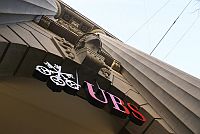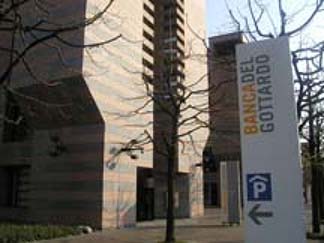By Lucy Komisar
Inter Press Service (IPS), July 18, 2008
 It sounded like the plot of an action thriller. A U.S. Senate subcommittee held hearings Thursday on how UBS/Switzerland, the world’s largest private bank, and LGT (Liechtenstein Global Trust), owned by the royal family of that micro-tax-haven state, organised complex tax evasion schemes for U.S. clients, and used spy-type tactics to avoid being detected.
It sounded like the plot of an action thriller. A U.S. Senate subcommittee held hearings Thursday on how UBS/Switzerland, the world’s largest private bank, and LGT (Liechtenstein Global Trust), owned by the royal family of that micro-tax-haven state, organised complex tax evasion schemes for U.S. clients, and used spy-type tactics to avoid being detected.
LGT bankers allegedly used code names and public phones instead of making calls that could be traced. UBS agents carried encrypted laptops and business cards that didn’t mention they were in the wealth management division. According to testimony and records, both banks took care to disguise their activities because moving and hiding the money of tax evaders and other criminals is very lucrative, bringing hundreds of millions of dollars in profits.
The Senate Permanent Subcommittee on Investigations had impeccable inside sources. One was Heinrich Kieber, who worked for LGT for two years, collected 12,000 pages of incriminating documents, including 1,400 names, on DVDs, and made them available to eight western countries, including the U.S. He is now in a witness protection programme with a secret identity and new name, hiding from a Liechtenstein international arrest warrant and 10-million-dollar bounty.
The other was Bradley Birkenfeld, a former UBS banker who had traveled to Washington to blow the whistle on his employers, and was blown off by Justice Department attorney Kevin Downing. Birkenfeld took his evidence to the IRS and the Senate Investigations Subcommittee. In pique that he couldn’t control the case, Downing railroaded a claim that Birkenfeld had helped a U.S. real estate mogul cheat on taxes. In fact, he was one of the people Birkenfeld exposed.
[This information was added after publication: Birkenfield would spend more than two years in prison and while there collected the highest IRS whistleblower award in history — $105 million, $75 million after taxes.The real estate crook, Igor Olenicoff, got off with a $52 million fine and no jail time. Downing left the Justice Department. And Birkenfeld would write Lucifer’s Banker, a riveting book about the story.]
Kieber appeared via a videotape that disguised his voice and appearance; it was the first time he has talked to the public. In 2002, Kieber had been assigned to scan and index all the documents of LGT Trust. As he read them, he was appalled. He said LGT helped not only tax evaders but facilitated corruption, links to dictators, and business deals to avoid a U.S. embargo.
He described how the system worked. He said LGT set up foundations and other entities into which clients transferred securities and cash (now over 99 billion dollars) and also real estate, paintings, and even patents. To block paper trails, it established special purpose vehicles (SPVs), either bank accounts or shell companies that owned and controlled accounts and were never registered in Liechtenstein, but in Panama, the British Virgin Islands, or sometimes Nigeria.
Kieber explained that LGT would transfer a client’s assets out of the U.S. through a country such as Canada, which would not raise tax authority suspicions. Then it would move through countries with weak or non-existing compliance laws and then through a Swiss bank such as the Banca del Gottardo in Lugano.
He said, This bank, in turn, has reciprocal rights to use the LGT Bank for its own customers. Banca del Gottardo is notorious, originally a subsidiary of Italy’s Banco Ambrosiano, known as the Vatican bank, which collapsed in 1982 after its CEO, Roberto Calvi, moved multi-millions offshore. Calvi was found hanging from Blackfriars Bridge in London.
Kieber explained, For an additional layer of concealment, either the Swiss bank or the LGT Bank often perform a fake cash-out transaction to make it look like the monies have been paid out in cash over the counter where in fact they have been transferred into the concentration account of the LGT Bank. (A concentration account comingles funds from numerous depositors.) At the same time, an equal amount would be credited to the client’s SPV account.
He said, The only purpose of all this is to make it extremely complicated for law enforcement agencies to follow the trail, as each step serves as a filtre to hide the track of the client’s money.
To insure secrecy, clients were told never to call LGT from home or work, but to use public phones and only in emergencies. Switzerland and Austria were used for outgoing calls and mail.
UBS followed a very similar pattern, according to the Senate subcommittee report on both banks issued at the start of the hearing. But it added a new element by expressly violating U.S. bank and securities laws that require people who solicit clients to be registered. About 20 UBS agents based in Zurich, Geneva and Lugano made about 300 trips to the United States since 2003, often traveling together to functions such as sailing races and art shows that UBS sponsored to attract wealthy potential clients. The agents would chat up the rich folks and persuade them to open accounts they could keep secret to evade taxes.
UBS/Switzerland has about 19,000 U.S. clients with a total of more than 18 billion dollars in assets that the bank labels undeclared to the U.S. Internal Revenue Service, and that have earned it 200 million dollars in profits.
Like LGT, UBS wanted clients kept secret. A bank document provides scenarios to train personnel in crossing borders without detection. One case says: After passing immigration desk during your trip to USA/Canada, you are intercepted by the authorities. By checking your Palm, they find all your client meetings. Fortunately you stored only very short remarks of the different meetings and no names.
When the European Union required banks to identify the beneficial owners of assets involved in wire transfers, UBS restricted its Swiss bankers’ use of wires and began to require clients to fly to Switzerland to withdraw cash. Or the bankers advised clients to use Swiss credit cards. They told them to destroy all off-shore banking records in the United States and to misrepresent the receipt of funds from their UBS bank account as loans.
Both banks had signed agreements with the U.S. in 2001 to report the names of U.S. citizens who had accounts holding U.S. securities. That rule had a giant loophole: U.S. citizens with accounts with foreign securities could stay secret. But the banks didn’t even adhere to the agreement they signed. In some cases, they set up offshore shell companies for clients and announced that these shells were now non-U.S. owners.
Mark Branson, chief financial officer of UBS Global Wealth Management in Zurich, told the subcommittee, We have decided to exit entirely the business in question. That means UBS will no longer provide offshore banking or securities services to U.S. residents through our bank branches.
But that is deceptive. Karina Bryne, a UBS spokesperson, told IPS that it meant that U.S. clients would be moved from bank branches not regulated by the U.S. Securities and Exchange Commission to accounts run by UBS Swiss Financial Advisors in Switzerland, which is U.S.-regulated and SEC-registered. She said that U.S. citizens who held foreign securities in Swiss accounts would still not be reported.
She said, There’s no law that prohibits a foreign bank from providing cross-border services. I wouldn’t want to comment on the tax evasion aspect.
Sen. Carl Levin, who chairs the subcommittee, said he had proposed a law that would attack tax havens head on. He said the Stop Tax Haven Abuse Act would create the presumption that a U.S. taxpayer who forms an entity in an offshore secrecy jurisdiction or who sends assets to or receives assets from an entity in a tax haven is liable for the income tax on those assets. The person would have to refute that presumption with evidence.
He said, They’re not going to be able to go to that [Grand Caymans] building that’s got tens of thousands of name plates with phony corporations without violating our tax laws. We have to take on that building in the Caymans and places around the world.



A list of 19,000 scofflaws is quite a list. One wonders who these “fine folk” could be. This coincides with one of your prior exposes concerning the client list of the clearinghouse which was primarily designated for major banking institutions and later expanded to give anonymity to virtually anyone (outlaw or not). Will the door be blown off or as with most financial scandals-a low thud? After all isn’t this the real reason for the year long prolonging of the announcement and extension to the already failed financial sector? That is: to allow the rats to jump and find refuge. So many mega yachts so little time.
Richard D. Gordon CP
It is all again a major example of a lot of smoke and mirrors and again it appears that some Financial Services are being very economical with the truth.
Recently read on the website http://www.solari.com where Catherine Austin Fitts deciphers the recent Housing and Recovery Act of 2008. Her expertise includes but is not necessarily exclusive to mortgaging regulations and discovered the utilization of various if not potentially all US government agencies as delivery systems for pilfering the taxpayers and funneling the funds serrupticiously to offshore accounts.
As former undersecretary of HUD, she discovered that the required annual financial statements and balance sheets were never filed as prescribed by law (also $3-4 trillion during the period 1999-2001 by the DOD). Nor does Congress have any right to conduct an audit. Clearly the clearinghouses located in Europe and elsewhere might have in their “19,000” accounts some of these long lost funds. In short, she estimates that the total amount “missing” over the years she had access to is $10 trillion. That would certainly buy a lot of politicians, even entire governments. Enuf said.
Richard D. Gordon CP